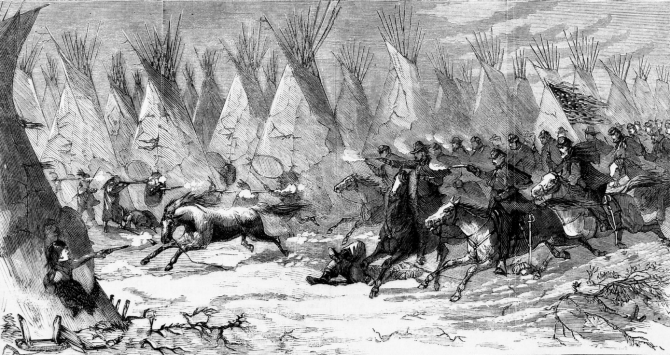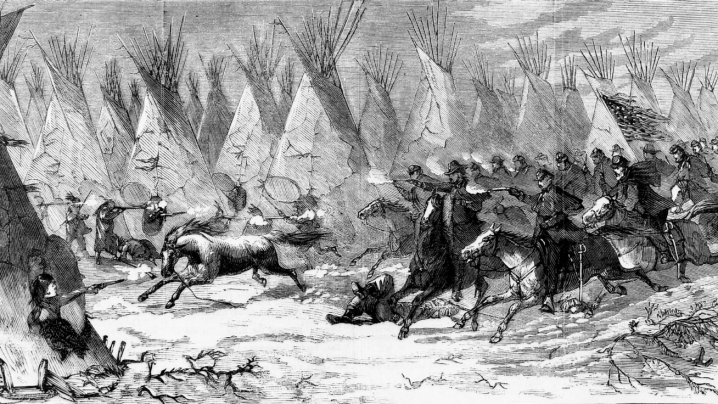[ad_1]

The 7th U.S. Cavalry charging into Black Kettle’s village at daylight Nov. 27, 1868 (Harper’s Weekly)
Wikimedia Commons
My great-grandfather was Thomas Carter, a black American who came to Wales, U.K., and married a white girl named Susanna Evans on Oct. 5, 1871, at Calvary Chapel Pontypridd in a village called Treforest, where he worked in the local ironworks. He is on the Wales 1871 census, living in 226a behind the Swan Inn in the district of Llantwit Fardre. It also records that he was born in 1845 and from North America. The couple moved around quite a lot between South Wales and Yorkshire, it appears.
Their marriage certificate states Thomas’ father was Samuel, a farmer, but deceased at this time. Thomas died Dec. 19, 1902, in Skelton, Yorkshire. Susanna was born July 15, 1849, registered in the district of Merthyr. Her mother was Rebecca Evans and father Richard James.
Family stories say Thomas came from North Carolina and possibly fought in a battle connected to Gen. Custer. I have no more solid information, which has made it very difficult to trace him back. It seems strange that a young African American would travel to the U.K. during that era. There are no travel records I can find, and I cannot find any British naturalization records. I would like to find out where he is from, if he did fight under Custer and whether he had been enslaved or free. —Mandy Rees
Your ancestor sounds like an adventurous man! However, did Thomas Carter really serve under the famed Civil War and Indian Wars commander Gen. George Armstrong Custer before immigrating to the United Kingdom?
It’s worth noting that Custer refused command of the black 9th Cavalry regiment (“buffalo soldiers”) after the Civil War, instead lobbying President Andrew Johnson for a transfer to a white cavalry unit, which he received when he was assigned the 7th Cavalry. Custer also opposed the 14th Amendment, which granted newly freed slaves U.S. citizenship after the Civil War, and was against black voting rights. A good source on his views about black people would be T.J. Stiles’ new biography of Custer, released in 2015: Custer’s Trials: A Life on the Frontier of a New America.
A potential battlefield link to Custer could be the units of the 10th Cavalry, who were also among the buffalo soldiers. They played a role in the Washita campaign (Oklahoma) in 1868-1869, which included the massacre of Cheyenne Indians led by Custer and his 7th Calvary.
We were not able to locate a published roster of the 10th Cavalry in any online source, but you could check to see if a Thomas Carter was listed in works such as On the Trail of the Buffalo Soldier II: New and Revised Biographies of African Americans in the U.S. Army, 1866-1917, by Irene Schubert and Frank N. Schubert, which includes brief biographies of many African-American men who served 1866-1917. Even if you are unable to locate Thomas Carter in this source, pay attention to the footnotes as they may help you determine other collections to check for your Thomas Carter.
Consider the possibility that Thomas Carter served in the Army but that the story about Custer is false. When we searched Ancestry.com’s collection of U.S. Colored Troops Military Service Records, 1863-1865 for Thomas Carter, there were a number of results because Thomas Carter is a common name. Based on your Thomas Carter’s birth date, two of them could be a match: one who was born about 1844 in Virginia and served in the 45th U.S. Colored Infantry, and another born about 1846 in Macomb County, Tenn., and who served in the 15th U.S. Colored Infantry. While neither of these birthplaces is North Carolina, they may be worth investigating further, since none of the results returned were for a Thomas Carter from North Carolina. It is possible that the birthplace in your family lore is incorrect.
Are There Any American Records of Thomas Carter?
Our suspicions that we would not locate your Thomas Carter on the 1870 U.S. census proved correct. It seems likely that he was already in Wales by that date, since he married the following year. If Thomas Carter had been a slave prior to emancipation, then it would be all but impossible to locate him via prior federal censuses, since the 1870 enumeration was the first to list all former slaves by name. However, because there was also a chance that Thomas Carter was free before the Civil War, we did a search of the 1860 census.
Interestingly, the only individual we found named Thomas Carter who was born between 1844 and 1845 in North Carolina was recorded as being mulatto. He was living in the household of Eliza Carter (presumably his mother) and what was likely a brother, John, who was born about 1850. We tried to search for this Thomas Carter in later census records but could not locate a match. In fact, John and Eliza were still living in Halifax, N.C., in 1870 in the same household with no sign of Thomas, which suggests he could be a match for your Thomas Carter, since he had already left the country by that point. Because there is not an older name in either census, it may fit with the fact that Thomas Carter’s father, Samuel, was deceased before his son’s marriage. We suggest searching for more records of this family to determine if there could be a connection to your Thomas Carter.
How Can U.K. Records Help to Shed More Light?
Since you have so little “solid information,” as you say, about Thomas Carter, it’s best to cast a wide net and gather as much information as you can about him and his children in the United Kingdom. Often we get stuck focusing on our direct ancestors, but examining records for other family members, specifically his children, may provide more clues—and perhaps a place of origin for Thomas.
You noted that the first record for Thomas Carter in Wales is the 1871 Wales census. By this date, he was already married to Susanna Evans and he was residing in Treforest, Llantwit Vardre, Glamorganshire, Wales. This record simply states that he was born in the United States, which is not a whole lot of information. However, by the 1881 England census, you have information on five of his children. It is possible that their birth records contain a more specific location of Thomas Carter’s birth.
The England and Wales FreeBMD Birth Index, 1837-1915 is available on Ancestry.com (subscription required). You can search this database for the location of the birth record from Thomas Carter’s children, such as his daughter Charlotte Ann Carter, who was born in 1874 in Wales. While this is just an index, it provides you with the information you need to order a copy of the original record that may include more information on Thomas Carter’s origins. You could search for and order birth records for all of his children to see if any of the records are more specific about their father’s origins.
Another option would be to see if you can order his naturalization record. According to the 1891 Wales census on Ancestry.com, Thomas Carter was a naturalized British citizen. This means that he naturalized by this date. You mentioned that you have not been able to locate a naturalization record for him, but it is possible that some record of his immigration exists; you just may have to order a search for the record. Beginning in 1836, immigrants to the British Isles were recorded in certificates of aliens, arranged by port. You may want to request a search for the record at the U.K. National Archive to see if one may exist that is not included in an online database.
Good luck in your continued search!
Henry Louis Gates Jr. is the Alphonse Fletcher University Professor and founding director of the Hutchins Center for African and African American Research at Harvard University. He is also chairman of The Root. Follow him on Twitter and Facebook.
Send your questions about tracing your own roots to TracingYourRoots@theroot.com.
This answer was provided in consultation with Meaghan E.H. Siekman, a senior researcher from the New England Historic Genealogical Society. Founded in 1845, NEHGS is the country’s leading nonprofit resource for family history research. Its website, AmericanAncestors.org, contains more than 300 million searchable records for research in New England, New York and beyond. With the leading experts in the field, NEHGS staff can provide assistance and guidance for questions in most research areas. They can also be hired to conduct research on your family. Learn more today about researching African-American roots.
Like The Root on Facebook. Follow us on Twitter.
[ad_2]





















